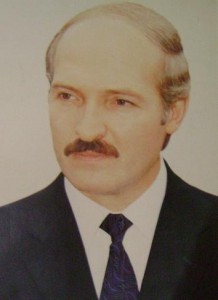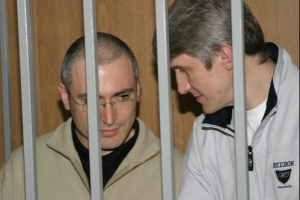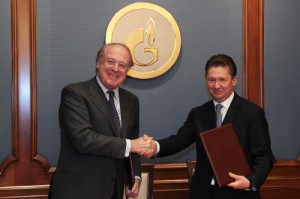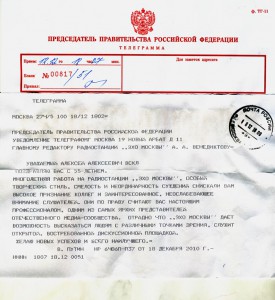Turning points: Syria and the Russian diplomacy. Stalingrad syndrome.
“Damascus is the “Stalingrad” of Russian diplomacy. After years of geopolitical withdrawal, Moscow has chosen Syria as a way to revive its image of power in the world. “Not one step back” is the Kremlin’s new strategy, as it was for the Red Army along the banks of the Volga river during World War II. To be more convincing, the Kremlin has simultaneously flexed its muscles by supplying sophisticated […]
Nessuno si faceva illusioni. Prima fra tutti Michail Khodorkovskij e Platon Lebedev che sapevano in anticipo che sarebbero stati nuovamente condannati, questa volta per frode allo Stato e riciclaggio. L’osservazione “il ladro resti in prigione”, pronunciata da Vladimir Putin alla vigilia della conclusione del procedimento giudiziario, aveva tolto quel 10% restante di incertezza.
Nessun imprenditore od oligarca russo, che ha operato negli anni Novanta, è senza macchia e può tirare la cosiddetta “prima pietra”. Senza paura di sbagliare si può tranquillamente affermare che Khodorkovskij e Lebedev non hanno commesso nulla di diverso da quanto fatto dai loro colleghi in quello stesso complesso primo decennio post sovietico in cui si sono formate e perse fortune gigantesche.
La differenza è che il duo della Yukos non è stato ai patti sottoscritti nella primavera 2000 dai principali magnati russi col Cremlino, anzi è arrivato persino ad offendere Putin. “Misha, fermati”, gli avevano intimato gli amici resisi conto che il giovane presidente era del tutto diverso dal malandato predecessore, Boris Eltsin.
Ed invece il testardo Khodorkovskij, credendosi invincibile, è andato avanti. Voleva entrare in politica ed aveva stretto un rapporto forte con i potenti circoli di Wall Street a cui intendeva vendere il 40% delle ricchezze energetiche dell’ex superpotenza. Conclusione: la Yukos è fallita, mentre Khodorkovskij è finito a cucire guanti nelle patrie galere in Siberia.
Nella storia russa è famosa la corrispondenza tra Ivan il terribile ed il principe Kurbskij. Quest’ultimo, dopo aver sfidato lo zar, era saggiamente fuggito all’estero, da dove si divertiva a stuzzicare con delle missive il potente moscovita, che lo invitava a rientrare in Patria per tagliargli la testa. Khodorkovskij, probabilmente, ha studiato male queste pagine della storia del suo Paese.
Il 2011 è un anno di campagna elettorale per le presidenziali di marzo 2012. Il potere si sarebbe trovato in libertà vigilata l’ingombrante Khodorkovskij, che secondo alcuni specialisti è riuscito a nascondere imponenti capitali e potrebbe voler cercare una rivalsa.
Washington e Berlino fanno bene a sottolineare il passo indietro compiuto dalla Russia sulla strada della democrazia e della costruzione di uno Stato di diritto. Ma finché si edificano gli Stati sulle personalità e non sulle istituzioni si rischiano queste scivolate.
L’Occidente ha bisogno di Mosca per rispondere alle sfide del XXI secolo. A Lisbona le ha proposto un accordo strategico, che se non colto al volo, rischia di far diventare la Russia la periferia della globalizzazione. Conti in sospeso o no, offese oltraggiose ed antipatie, è venuto il momento che anche nella sala dei bottoni moscovita capiscano che c’è un limite alla decenza. Se si vuole essere trattati da pari nel club dei Potenti del mondo bisogna raggiungere perlomeno “gli standard minimi”.
«Приднестровье – европейское государство с устойчивым российским вектором развития. Этим и объясняются многие сложности, с которыми сталкивается республика весь период своего существования. Находясь в контактной зоне геополитических интересов Евросоюза и России, Приднестровье в последние годы особенно чувствует европейское влияние», – отметил заместитель министр иностранных дел ПМР Сергей Симоненко. По словам представителей МИД, Приднестровье высказало свою заинтересованность в реализации проекта еврорегиона, «но только в качестве равноправной стороны наряду с Молдовой и Украиной».
Статья – Новый Регион – Приднестровье
Moldovan Prime Minister Vlad Filat became acting president automatically at the moment the first session of the new Moldovan parliament was convened, the Moldovan Constitutional Court told Interfax.
“This is stipulated by the Constitution, and there is no need to adopt any legislative acts. If there had been a legitimately elected president in Moldova, he would have continued performing his duties until the new parliament elected a new president. However, Moldova had an acting president, parliamentary speaker Mihai Ghimpu. His powers expired at the moment the mandates of the newly elected parliamentarians were recognized and the first parliamentary session was convened. When the new parliament elects a speaker, the presidential duties will be delegated to him. For the time being, the prime minister is acting president,” the court said.
Filat said in an interview that he was disappointed that a parliamentary majority was not put together and a parliamentary speaker was not elected on December 28th. A two-day recess has been announced in the first session of the new Moldovan parliament at the Democratic Party’s request, and it will continue until Dec. 30.
Meanwhile, negotiations on setting up a ruling coalition continued on Wednesday. Democratic Party leaders met with members of the Party of Communists, after which Democratic Party leader Marian Lupu met with Liberal Party leader Mihai Ghimpu. Then Lupu, Ghimpu, and Filat held a tripartite meeting.
A simple majority of 51 seats is enough in the Moldovan parliament to form a government and other governing bodies, but the votes of at least 60% of all the deputies, i.e. 61 out of the 101 votes, are necessary to elect a president.
There were no clear winners at last November’s Parliamentary elections. Moldova is in a long deep political crisis, started in April 2009, and some observers see risks for its future as an independent state. Recently, Romanian president Traian Basescu said that “in the next 25 years Romania and Moldova could be united again.” The Transdniestrian region broke away from Chisinau when USSR collapsed at the beginning of the Nineties.
Kyiv is not planning to speed up the drafting of an association agreement in terms of a free trade area under the conditions being set by the European Union and will continue to defend its interests, Head of Ukraine’s Mission to the EU Kostiantyn Yeliseyev has said in an exclusive interview with Interfax-Ukraine. He also added that the Ukrainian side “is holding talks not for the sake of talks and not for the sake of the period ‘by the end of 2011,’ but for the sake of content.”
“Yes, there is a political directive to end the talks as soon as possible, but this should not be done at the expense of the quality of the agreement. The content of the agreement should not be the subject for compromise, and even the time frame cannot be an excuse in order to weaken our positions. I want the EU to understand this,” Yeliseyev said.
In this connection, he noted that “sometimes it’s better to hold talks a little longer, because it’s not difficult to sign the document.” “We can sign the agreement even today, but the Ukrainian side is not worried about the signing, it’s worried about how we will implement it. We’ll be unable to implement this agreement effectively and successfully under the conditions that are currently being set,” the Ukrainian diplomat said.
Interfax – Ukraine
Почему у Лукашенко новый премьер-министр.
29 Dec 2010«Сидорский слишком долго был в объятиях Путина, поэтому Лукашенко решил убрать такого достаточно неприятного для него премьера, который может в нужный момент оказаться на стороне Путина … у Мясниковича по сравнению с другими возможными претендентами на портфель премьер-министра есть два преимущества: Мясникович — опытный аппаратный волк, который знает устройство власти от и до, не делает ошибок и будет полностью находиться в воле первого лица; у него сохранилась своя управленческая сеть — это люди среднего звена в министерствах и ведомствах, на которых он сможет опереться, если получит команду на углубление процессов экономической либерализации… Мясникович — это человек, который хорошо знает механизмы приватизации по-чубайсовски».
Статья – БГД Минск
Gazprom, Eni strategic partners till 2012.
24 Dec 2010Russia’s Gazprom and Italy’s Eni have extended their 2006 strategic partnership until 2012. The companies signed agreements for technical-scientific cooperation in the upstream and downstream sectors. Integrated working groups will be set up to study application of drilling, production, transportation, energy saving and liquefied natural gas (LNG) technologies and processes, as well as personnel training, Gazprom said.
Under the 2006 agreement, Eni and Gazprom have launched joint projects in mid and downstream gas, in the upstream sector and in technological cooperation, including the South Stream gas pipeline project to bring Russia’s gas to Europe.
Alexey Miller, Chairman of the Gazprom Management Committee and Paolo Scaroni, Chief Executive Officer of Eni, also discussed gas supplies to Italy and implementation of measures for French EDF entry in the shareholding structure of South Stream AG..
Георгий Чичерин, книга Людмилы Томас.
20 Dec 2010«Новая биография отца советской дипломатии Георгия Чичерина была представлена в конце прошлой недели в Москве. Имя первого наркома иностранных дел СССР сейчас известно разве что узким специалистам. А зря. Если верить биографу наркома Людмиле Томас — Чичерин был одним из самых необычных и даже экстравагантных советских лидеров».
Статья – Московский Комсомолец № 25529 от 20 декабря 2010 г. Михаил Ростовский – Mikhail Rostovsky Moskovskij Komsomolets
Путин, “Эхо Москвы”, Венедиктов.
20 Dec 2010В.В. Путин поздравил главного редактора радиостанции “Эхо Москвы” А.А. Венедиктова с юбилеем.
А.Венедиктов: «Я не диссидент, я – профессионал» – 31 октября 2010 – 1TV.
Bielorussia, presidenziali scontate.
18 Dec 2010 Le presidenziali bielorusse paiono davvero scontate. Tutti i sondaggi della vigilia danno il capo dello Stato uscente Aleksandr Lukashenko, nettamente in testa con un notevole margine di vantaggio sulla somma dei voti che dovrebbero ottenere i suoi 9 sfidanti messi insieme. Se nel 2006 la competizione poteva considerarsi aperta, poiché l’opposizione era riuscita a nominare un solo candidato (Aleksandr Milinkievich), adesso ognuno è andato per conto suo. Nel 2008 il fronte anti-governativo non è riuscito ad eleggere nemmeno un suo rappresentante in Parlamento.
Le presidenziali bielorusse paiono davvero scontate. Tutti i sondaggi della vigilia danno il capo dello Stato uscente Aleksandr Lukashenko, nettamente in testa con un notevole margine di vantaggio sulla somma dei voti che dovrebbero ottenere i suoi 9 sfidanti messi insieme. Se nel 2006 la competizione poteva considerarsi aperta, poiché l’opposizione era riuscita a nominare un solo candidato (Aleksandr Milinkievich), adesso ognuno è andato per conto suo. Nel 2008 il fronte anti-governativo non è riuscito ad eleggere nemmeno un suo rappresentante in Parlamento.
Presidente dal ’94, criticato da Russia, Unione europea e Stati Uniti Lukashenko, definito dall’Amministrazione Bush “l’ultimo dittatore” del Vecchio Continente, non ha avversari in Patria anche grazie al ferreo controllo dei mass media. Gli osservatori dell’Osce hanno già certificato la disparità del loro uso fra i candidati.
Russi ed occidentali hanno in questo momento altri problemi per scontrarsi sulla Bielorussia. Così se le elezioni saranno “democratiche” o avranno una parvenza di esserlo l’Unione europea garantirà a Minsk un credito di 3 miliardi di euro. Da settimane circola voce che dopo le presidenziali la Bielorussia rischia il default per le eccessive spese di questi mesi. La Russia, invece, ha già concesso ai fratelli “bianchi” vantaggi doganali e fiscali, simili a quelli goduti in passato, sulla raffinazione e sulla vendita del proprio petrolio all’estero.
Democraticamente “Batka” ha permesso di apparire per un’ora in televisione a ciascuno dei suoi 9 litigiosi avversari alcune settimane prima del voto in modo che gli elettori abbiano il tempo di dimenticarseli. Ma è bene sottolinearlo tra loro non vi sono rilevanti personalità che potrebbero coagulare un fronte anti-Lukashenko.
«Политкорректность» по-русски.
17 Dec 2010«В отличие от России в Германии и на всем Западе показательно уважают слабых, аутсайдеров — тех, которые на первый взгляд лучше всех годятся в козлы отпущения. Это уважение также называется “политкорректность”. А большинство моих русских знакомых терпеть не могут эту политкорректность. И показательно практикуют неполиткорректность…
Русские, может быть, самый неполиткорректный народ Европы, если не мира. Но это еще никакой не приговор… Кстати, и сексуальная корректность достигла у нас абсурда. Еще в мои студенческие годы в Берлине ночью, когда навстречу шла одинокая девушка, мы переходили на другую сторону улицы, сигнализируя беззащитной девице, что никоим образом не намерены ранить ее женское достоинство. Конечно, приятнее жить в стране, где девушки, наоборот, обижаются на таких трусливых перебежчиков…
Неполиткорректность бывает честнее политкорректности, как удачная шутка, которая за интеллектуальными запретами или общественными табу открывает всю их пустоту и лживость… Русская неполиткорректность переросла в свою, особую — мелкорусскую — политкорректность. Шутим и издеваемся исключительно над несвоими или слабыми — над “чурками”, гастарбайтерами, бомжами, либералами да голубыми. А власть, святую свою власть, уважаем….»
Штефан Шолль Cтатья Московский Комсомолец № 25527 от 17 декабря 2010 г. Stefan Scholl Moskovskij Komsomolets
Welcome
We are a group of long experienced European journalists and intellectuals interested in international politics and culture. We would like to exchange our opinion on new Europe and Russia.
Categories
- Breaking News (11)
- CIS (129)
- Climate (2)
- Energy&Economy (115)
- EU Eastern Dimension (85)
- Euro 2012 – Sochi 2014 – World Cup 2018, Sport (43)
- Euro-Integration (135)
- History Culture (198)
- International Policy (261)
- Military (74)
- Interviews (18)
- Italy – Italia – Suisse (47)
- Odd Enough (10)
- Poland and Baltic States (126)
- Religion (31)
- Russia (421)
- Survey (4)
- Turning points (4)
- Ukraine (176)
- Российские страницы (113)
Archives
- November 2020
- October 2020
- September 2020
- August 2020
- July 2020
- May 2020
- April 2020
- March 2020
- January 2020
- December 2019
- November 2019
- October 2019
- September 2019
- August 2019
- July 2019
- June 2019
- May 2019
- April 2019
- March 2019
- February 2019
- December 2018
- November 2018
- October 2018
- September 2018
- August 2018
- July 2018
- June 2018
- May 2018
- April 2018
- March 2018
- February 2018
- January 2018
- December 2017
- November 2017
- October 2017
- September 2017
- August 2017
- July 2017
- May 2017
- March 2017
- January 2017
- December 2016
- November 2016
- October 2016
- September 2016
- July 2016
- June 2016
- May 2016
- April 2016
- February 2016
- January 2016
- November 2015
- October 2015
- September 2015
- June 2015
- April 2015
- March 2015
- February 2015
- January 2015
- December 2014
- November 2014
- October 2014
- September 2014
- August 2014
- July 2014
- June 2014
- May 2014
- April 2014
- March 2014
- February 2014
- January 2014
- December 2013
- November 2013
- October 2013
- September 2013
- August 2013
- July 2013
- June 2013
- May 2013
- April 2013
- March 2013
- February 2013
- January 2013
- December 2012
- November 2012
- October 2012
- September 2012
- August 2012
- July 2012
- June 2012
- May 2012
- April 2012
- March 2012
- February 2012
- January 2012
- December 2011
- November 2011
- October 2011
- September 2011
- August 2011
- July 2011
- June 2011
- May 2011
- April 2011
- March 2011
- February 2011
- January 2011
- December 2010
- November 2010
- October 2010
- September 2010
- August 2010
- July 2010
- June 2010
- May 2010
- April 2010
- March 2010
- February 2010
- January 2010
- December 2009
- November 2009
- October 2009
- September 2009
- August 2009
Our books







